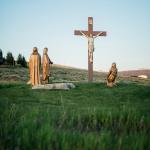
When we think of the early church, we think of Peter, Paul, and the apostles. But what about Apollos? What can his story tell us about our place in God’s work?
Scripture:
Leviticus, chapters 15-17; Acts, chapter 18
Acts 18:24-28 (NASB):
Now a Jew named Apollos, an Alexandrian by birth, an eloquent man, came to Ephesus; and he was proficient in the Scriptures. This man had been instructed in the way of the Lord; and being fervent in spirit, he was accurately speaking and teaching things about Jesus, being acquainted only with the baptism of John; and he began speaking boldly in the synagogue. But when Priscilla and Aquila heard him, they took him aside and explained the way of God more accurately to him. And when he wanted to go across to Achaia, the brothers encouraged him and wrote to the disciples to welcome him; and when he had arrived, he greatly helped those who had believed through grace, for he powerfully refuted the Jews in public, demonstrating by the Scriptures that Jesus was the Christ.
Observations: Apollos of Alexandria
Apollos is a relatively important figure in the New Testament story, although most people probably don’t know much about him. We meet him here in Acts 18, when he comes to Ephesus. Luke tells us three things about Apollos: he was an Alexandrian by birth, an eloquent man, and proficient in the Scriptures. Each of those traits shaped Apollos and his ministry.
The fact that he was Alexandrian by birth tells us that he grew up in the Jewish community there, which was renowned for its learning. This community was instrumental in the translation of the Hebrew Scriptures (Old Testament) into Greek. This translation, known as the Septuagint, was the “Bible” that most of the New Testament church used. Apollos’ connection with the Jewish community in Alexandria tells us that he was educated in both the Scriptures and in classical Greek learning.
That background helps us to understand the other two things Luke tells us – that Apollos was eloquent and proficient in the Scriptures. To use more familiar language, he had gifts that God could use to help spread the Gospel. That brings us to the next verse, and two more things that Luke tells us: he had been instructed in the way of the Lord and he was fervent in spirit. Someone had helped him to make the connection between the Scriptures that he knew and their fulfillment in Jesus. And Apollos was passionate about the way of the Lord – he wanted others to come to know what he knew.
Apollos in Ephesus
Luke tells us that when Apollos arrived in Ephesus, he did the same sort of thing that Paul did: he began speaking boldly in the synagogue. Being a Jew, Apollos went to his fellow Jews. He spoke their language – he knew the Scriptures – and he was a forceful orator. But something was missing. Luke tells us that he was acquainted only with the baptism of John. That means that although he was accurately speaking and teaching things about Jesus, he didn’t have the whole story.
That’s where Priscilla and Aquila come in. We met them at the beginning of this chapter. They had come to Ephesus from Rome after the Emperor Claudius ordered all Jews to leave the capital. They met Paul in Ephesus, and worked with him for quite a while until he left for Jerusalem. They stayed in Ephesus, and it was after Paul left that Apollos arrived. But when Priscilla and Aquila heard him, they took him aside and explained the way of God more accurately to him. In other words, they “filled in the blanks” in his spiritual instruction.
Apollos Goes to Corinth
After Priscilla and Aquila helped Apollos to more fully understand the Gospel, he wanted to go across to Achaia – in other words, the region of Greece where Corinth was located. When he got to Corinth, he greatly helped those who had believed through grace, for he powerfully refuted the Jews in public, demonstrating by the Scriptures that Jesus was the Christ.
That brings this chapter full circle. At the beginning of chapter 18, Paul had arrived in Corinth and begun to minister. When the Jews opposed him, he focused his ministry on the Gentiles. The Jews, however, continued to stir up trouble against him. They brought charges against Paul before the proconsul, but he refused to intervene. He recognized that this was “just” a religious dispute, and he would not get involved.
So when Apollos arrives, those whom Paul had led to faith were still in Corinth, working to share the good news. Apollos greatly helped those who had believed and he powerfully refuted the Jews. Apollos came on the scene quickly, seeming out of nowhere, and helped encourage the church in Corinth at an important time in its life. And then, just as quickly, he disappears from the scene.
Application: Apollos and the Work of the Church
We have a tendency to want to “hold on” to people, events, and situations. Maybe it’s because we think that things are “working.” Perhaps it’s because we’re comfortable with how things are, and we don’t really like change. But we need to remember that it is not our work, not our church; it all belongs to God. And Apollos’ story reminds us that God has a time and a place for everyone to work in His Kingdom. In the story of the early Church, Apollos is a “flash in the pan” – he showed up unannounced, did powerful and important work, and then disappeared from the scene.
In 1 Corinthians we see what happens when we try to “hold on” to people and situations. Although Paul had been the founder of the church in Corinth, after he left people started to divide into camps. In 1 Corinthians, Paul addresses this division:
- Now I mean this, that each one of you is saying, “I am with Paul,” or “I am with Apollos,” or “I am with Cephas,” or “I am with Christ.” Has Christ been divided? (1 Corinthians 1:12-13a)
- For when one person says, “I am with Paul,” and another, “I am with Apollos,” are you not ordinary people? What then is Apollos? And what is Paul? Servants through whom you believed, even as the Lord gave opportunity to each one. I planted, Apollos watered, but God was causing the growth (1 Corinthians 3:4-6).
Apollos sets a powerful example for us. He was ready when God called, and devoted himself to the work God set before him. But he didn’t try to hold on; when his work was done, he moved on to whatever God had next. What does God have next for you?
Prayer:
Father, thank You for reminding us that You have a place for each of us. That place is not just somewhere to be, but something to do. You created us for good works (Ephesians 2:10); help us to fulfill the calling that You have placed before us. Bless us today as we seek to honor You with our obedience. Amen.













